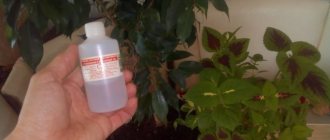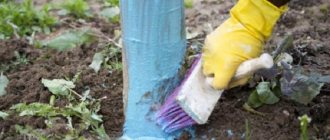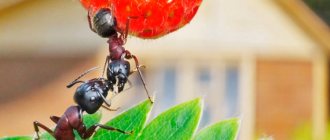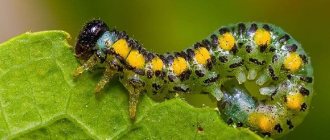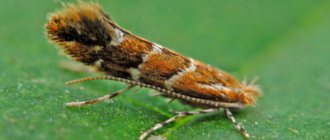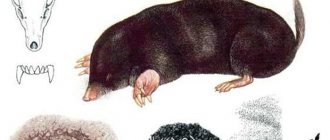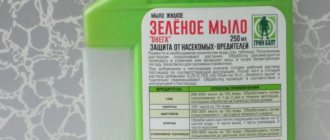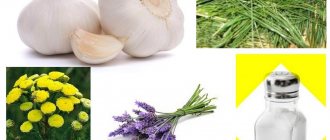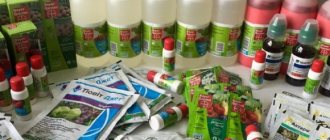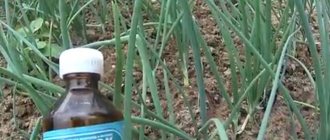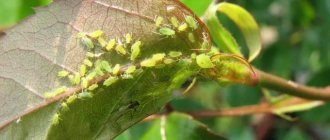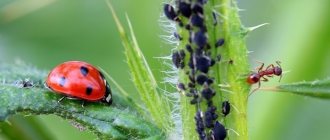Gardeners and gardeners have to work hard to protect their crops from pests and get a good harvest. In early spring, aphids begin to attack young shoots. There are no barriers or boundaries for her. With equal zeal it will reproduce on garden weeds, roses, cabbage, apple trees and currants. It usually settles on the underside of leaves and also clings to tender young shoots. Today we will talk about fighting this pest using a simple and affordable remedy.
What is an aphid?
This is a small sucking insect up to 22 mm in size. They come in green, red or black. Leaf and shoot aphids are always found in colonies, which is their main danger to plants. A few tiny creatures will not be able to cause significant harm. But hundreds and thousands of aphids suck the juices from fresh shoots, drying and destroying them. In addition, with its secretions it covers the stomata of the leaf, preventing it from breathing. Gardeners often use a soap solution against aphids, noting that this is a safe and effective way to control the pest.
How does laundry soap help fix a natural insecticide?
Laundry soap in the garden is a reliable assistant in the fight against pests. Make a decoction or infusion with onion or garlic peels, lemon zest, red pepper, etc. The smell of such an infusion perfectly repels insect pests, but in order for the odorous liquid to linger on the plant, a fixative is needed. Laundry soap is such a fixative.
Recipe: add grated household goods to the infusion. soap (a small amount so as not to burn young plants).
Treating plant leaves with laundry soap in the garden will help the plant not to be attacked by garden pests
Carrier of infections
Few people know that aphids are such a dangerous insect. It is the main carrier of various viral infections that cause gall formations on leaves. These are hard growths on the leaves that weaken the entire plant, which can lead to its death. In addition, garden ants are very fond of aphids. They breed it themselves and transfer it to the trees after winter from their burrows. Therefore, you have to fight the ants at the same time. A soap solution against aphids is best suited for this.
How to identify a lesion
If you regularly inspect your plantings, you will not be able to miss the changes happening to them. The leaves and tops are bent, the shoots do not grow, which means you need to look for the cause. Aphids pose the greatest danger to young and immature plants. But even large trees have a hard time. The insect is very prolific, it reproduces quickly and massively. Every two weeks a new generation is born. The female lays 150-200 larvae at a time. Therefore, the population is growing at a fantastic rate, and the fight against it involves enormous efforts.
So, be sure to pay attention to the following signs:
- If the underside of the leaves has changed color, it is covered with honeydew.
- White scales on the ground, near the plant. These are the shells that the insect sheds. With a large population, it is almost impossible not to notice them.
- Ants love aphids very much. If they start scurrying around the plant, then you need to prepare for a fight. It is now that a soap solution against aphids can help best.
- Leaves curl and turn yellow. Be sure to inspect them for pests.
- Undeveloped and twisted buds are also direct evidence of insect activity.
Prevention
The sooner you start fighting pests, the more effective it will be. It is best to treat the tree in a timely manner in April, when the foliage is just beginning to bloom. At this time, a soap solution against aphids helps the best. It allows you to protect the tree from crawling along the trunks of ants, which are carriers of aphids. Therefore, by processing in advance, you will protect not only your harvest, but also the health of the tree itself.
Thus, the trunk and branches will need to be treated for the first time in April, when the leaves are just beginning to bloom. Of course, aphids are dangerous not only for fruit trees, but at this time of year there are still no cucumbers and cabbage in the beds that you can profit from. Additional protection in the month of April are special collars that help prevent ants from moving along the trunk. This is additional protection in case the soap and water dries out and loses its effect.
Prevention of fungal diseases
Using laundry soap you can resist fungal diseases. The solution allows you to fight gray mold (Botrytis cinerea), which most often affects strawberries, cabbage, onions, cherries, peppers and other crops. At the initial stage, you can detect a light gray coating. Soon it begins to actively spread, all parts of the plants become lethargic, rot and fall off. Plants can be protected from this disease by treating them with a soap-based solution. Grate half a block and dilute the shavings in 10 liters of water. To enhance the effect of the composition, it can be supplemented with tansy or garlic extract. Treat every 2 weeks. A total of 3 such procedures will be required. 157
Related article:
When to plant gladioli in open ground in spring, how to do it correctly
Folk methods of struggle
If you decide to stop using chemicals in your garden, then get ready to spend a lot more time on it. For example, a systemic insecticide allows you to completely get rid of pests with guaranteed protection for 2-3 months. That is, one treatment can provide an entire summer without insects. But folk remedies do not destroy insects and their larvae; they only have a repellent effect. Therefore, they must be used at least three times in a row, with an interval of no more than 5-7 days. Further as necessary, but be prepared for the fact that you will have to return to processing more than once during the season.
Fighting caterpillars with soap
Every summer resident runs the risk of encountering an infestation of caterpillars in the warm season. These pests cause serious damage to the crop, devouring everything that comes in their way. Collecting them by hand is long and tedious. You don’t have to bother yourself, just treat it using soap and herbs.
In the fight against caterpillars, a product based on pharmaceutical chamomile (1 kg of raw material per bucket of water) and natural soap (a third of a bar) has proven itself to be effective. No less effective is an infusion of tobacco leaves (400 g of raw material per bucket of water) with the addition of soap (50 g). Treatment will have to be carried out every 7-10 days (twice). Fighting mealyworms with soap
In most cases, the pest attacks window plants. Together with the seedlings, it can move to a greenhouse or greenhouse. Insects can cause serious damage to plants and are quite difficult to control. If you are able to detect a nascent colony on plants, take action immediately. In such a situation, also use a soap solution. For 1 liter of water you will need 20-30 g of shavings. Treat the leaves and stems with the liquid, and do not forget to water the soil in the pots with it. Pay special attention to the back of the leaves and where the stems emerge from the soil. After 2-3 hours, rinse the plant in the shower. To eliminate mealybugs, you need to spray once every 7 days. As soon as it disappears, the procedures should be stopped.
Related article:
Pharmacy products that can be used to protect your garden
Hygiene on guard
The most famous remedy is a soap solution to combat aphids. How does such a familiar and accessible remedy help get rid of a pest? The fact is that treatment with a soap solution helps create a special film on the entire surface of the plant. From this time on, the plant becomes inedible for aphids. Of course, any rain and watering will destroy this coating, and the work will have to start all over again. But soap does not harm the plant at all and does not in any way affect the formation of fruits. You receive organic fruits and vegetables.
ANTI-APHID WASH SOAP
Under the pressure of a soap solution, the irrepressible aphid will lay down its heads just as quickly as under the influence of specialized drugs. For me, laundry soap is the number one remedy in the fight against aphids during the fruiting period of plants, when the use of “long-lasting” insecticides is no longer appropriate.
I grate 2 bars of soap: 72% concentration (weighing 150 g each) and thoroughly dissolve the shavings in 10 liters of hot water. I spray the plantings affected by aphids with the cooled liquid or simply dip the tops of the plants, where these pranksters usually swarm, into a soapy solution. The soap solution clogs the spiracles of the pests, and usually the next day I do not find the aphids in the same place. (But there is no need to prevent the plants themselves from breathing, and after an effective soap attack, I always wash off the soap film from the shoots and leaves of plants from a watering can or hose.) If individual aphids manage to avoid the soap solution and they remain alive, I repeat the treatment again a few days later.
Ivan Russkikh: A safe miracle remedy for pests! We save the garden and vegetable garden
Difficult choice
Now let's talk in more detail about how to prepare a soap solution for aphids. Most often it is recommended to use it, citing its high alkali content. In fact, this fact is not leading, since any soap can disrupt the nutrition of an insect and thereby lead to its death or migration.
If you do not plan to add anything else to the solution, then you should pay more attention to the type of soap you use. Pay attention to varieties that have a pronounced disinfectant and antibacterial effect.
- Ordinary, household. The cheapest option. If it comes into contact with insects, it can cause their death.
- Degtyarnoe. A soap-ash solution for aphids, supplemented with birch tar, is a potent remedy for eliminating garden pests.
- Green soap. It is sold in specialized country stores. This gel-like substance is essentially an insecticide.
Toilet soap
A great-smelling bar of soap that is soft pink or blue is the worst option. Firstly, its cost is quite high. Secondly, all the flavors and dyes that are used in its composition are not at all beneficial for your plants. Moreover, after the rain all this will fall into the soil and then be absorbed by the roots of the plants. As a result, you harm yourself even more than using modern insecticides.
Flower garden treatment
If you have roses growing on your property, then you probably had to deal with the attack of these greedy insects on them. They love to cling to the buds, feeding on its delicate juice. As a result, the flower blooms with a defect or dries out completely. The soap solution against aphids on roses works flawlessly. To increase its effectiveness, experienced gardeners recommend adding wood ash to it.
To prepare, you will need three liters of water and half a glass of grated soap, a glass of ash or charcoal. It is necessary to leave the solution for 6 hours so that it can infuse. Now strain and you can start processing. It is recommended to repeat the treatment at least three times.
Soil deoxidation with soapy water
The pH level of laundry soap ranges from 11 to 12. It is characterized by a sharp alkaline reaction, so it can help if you need to neutralize the acidity of the soil. It is not always appropriate to use a soap-based solution for large areas; in this case, it is advisable to rely on materials in the form of gypsum, dolomite flour, and chalk.
This deoxidation method is ideal for a modest area. You can use a soap solution to treat a flower bed that was previously occupied by conifers or a former strawberry bed. The advantage of the product lies not only in its effectiveness, it can be prepared in a matter of minutes. Take a bar of soap and grind it using a coarse grater. Dissolve the resulting soap shavings in a small amount of water. Pour the mixture into a 10 liter bucket filled with water. Please note that this amount is enough for you to water 1 square. m. plot. If you wash dishes with laundry soap, you can also use the remaining liquid to treat acidified soil.
Related article:
How to process raspberry and currant bushes
Let's protect cucumbers
This crop is attacked by these little pests very often. Moreover, this is visible to the naked eye. The leaves wither, the vines fall, and you can no longer expect fruit from such a plant. The soap solution against aphids on cucumbers has proven to work very well, so all gardeners recommend its use to each other. To prepare, you will need the same base, three liters of water and 0.5 cups of soap. To ensure that insects leave the garden alone, 100 g of crushed tobacco is added to the solution. Mix all the ingredients and leave to brew well for two days. After this, be sure to stir and strain. The solution is now ready for use. It is perfect for processing vegetable and fruit crops. It has proven itself very well in practice.
How to process flowers
Aphids love roses very much, so most likely you have already fought against them. The juice of rose buds and flowers is very attractive to pests. The soap solution will help against aphids and when treating roses, it will be extremely effective. To improve the effect, you can add a little ash. Three liters of water, plus one hundred grams of grated laundry or baby soap, plus two hundred grams of wood ash are the ingredients needed for the solution. The solution should sit for six hours. Typically, plants are treated with the solution in at least three approaches.
Berry bushes
Aphids are not picky insects. If it gets a chance to breed in a garden plot, then it systematically takes over the entire territory. Continuing the topic of using folk remedies to control pests, I would like to say separately about the treatment of berry bushes. The soap solution for aphids on currants is prepared in a slightly different way. There's a secret ingredient called baking soda. To prepare the solution, you will need to take a liter of warm water and a tablespoon of soda ash, as well as 50 g of grated soap. All components must be thoroughly mixed and shaken. Leave for 5-6 hours and strain off the remainder.
Laundry soap for plant protection
In what cases is laundry soap used?
Laundry soap is used in gardening and floriculture:
- when soil properties change;
- for hygienic purposes (for washing plants);
- to combat pests and fungi;
- for fixing solutions on plants.
Let's look at each case in more detail.
Change in soil properties
In some areas the soil is very acidic. In such soil, many plants simply will not survive, so it is necessary to restore the neutral reaction of the soil, and this can be done with the help of laundry soap. To restore a pH comfortable for plants on large areas of land, methods such as adding dolomite flour and other deoxidizing compounds are used, but small acidified areas - beds or flower beds - are restored using laundry soap: 150 g of grated soap is dissolved in 1 liter of warm water and mixed with 10 liters of water. This solution should be enough for 1 m² of the treated area.
- Summer is here - what to do in the garden in July
In the photo: Grinding soap
Fighting fungal diseases
Laundry soap is an excellent helper in the fight against some fungal diseases, for example, gray rot on strawberries. To prevent the development of gray rot, 10 g of grated laundry soap should be dissolved in 1 liter of water and the plants should be treated with this solution.
Laundry soap against insects
Soap is also effective in fighting insects. To kill aphids, prepare a solution of 300 g of soap in 10 liters of warm water: the soap must be completely dissolved so that the solution does not contain lumps. It is advisable to strain the solution after preparing it, then there will definitely be no soap clumps in it, which, if they get on young leaves, can leave burns. The solution is sprayed on the leaves of herbaceous plants, shrubs and trees. In this case, the soap acts like a film: it blocks the access of air to the insects, and as a result they die. A solution of laundry soap will also help in the fight against spider mites.
3 hours after treatment, the composition must be washed off the plants with a large amount of clean water, for example, using a hose.
Infusions of natural herbs - chamomile and tobacco - will help get rid of caterpillars and butterflies. In this case, laundry soap acts as a fixative, preventing liquid from quickly draining from the leaves. The animal fats that make up the soap firmly hold the infusion on the surface of the sheet for 7 or even 10 days. One treatment with natural insecticidal infusions is unlikely to be enough, so they are used in 3-4 stages at intervals of a week.
In the photo: Plant treatment
Sometimes when growing seedlings at home, there is a danger of seedlings becoming infected with mealybugs, which can get into the greenhouse along with the seedlings. If you miss the moment of pest reproduction, then it will be very difficult to fight the multiplied scale insects. Pests are easy to spot because they live in colonies. As soon as you are convinced that you are dealing with scale insects, immediately treat the seedlings with a solution of 20 g of laundry soap in 1 liter of water: thoroughly moisten all the above-ground parts of the plant with the composition, including the underside of the leaves. And do not forget to protect the substrate with a film from soap before treatment, and after 15-20 minutes, carefully rinse the solution from the plants.
How you can maintain the hygiene of indoor plants and rid them of pests and fungal diseases using laundry soap, you will learn from the video:
- Where to buy sprayers?
Processing of equipment and inventory
When using garden tools and seedling containers repeatedly, they require regular disinfection, since fungus can live on the surface of tools and utensils for a very long time. Tools and containers are treated with a strong soap solution, and after a while it is washed off. It is not recommended to use a solution of laundry soap to disinfect metal parts and objects. To avoid the appearance of rust on them, it is better to disinfect them with a volatile antiseptic, for example, alcohol.
